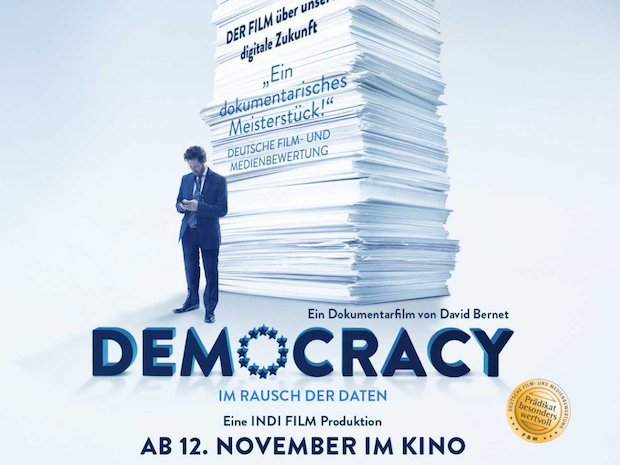Democracy, film review: How the EU's data protection law was made


"We'll never finish with it." The dispirited speaker was the MEP Jan Philipp Albrecht, sometime in early 2013. He was contemplating an impasse that might cost him the right to be taken seriously for the rest of his political career. The rapporteur charged with negotiating EU data protection reform, Albrecht was facing a pile of 4,000 amendments, a superposse of lobbyists, and a parliament of MEPs all unhappy for different reasons. And then: Snowden.
Albrecht's moment of despair is the turning point in Swiss filmmaker David Bernet's Democracy: Im Rausch der Daten (literally, "inside the noise of data"), a black-and-white documentary about the extended process of moving data protection reform from an idea hashed out over a series of privacy breakfasts to legislation.
Bernet follows this story from Albrecht's viewpoint, beginning with the moment on the morning of the final vote when Albrecht follows instructions on his phone to knot the tie around his neck -- because although he thinks ministers should listen to people no matter what they're wearing, there's too much at stake to risk being ignored for not obeying the dress code.
We flash back to the moment a year and a half earlier when it occurs to Albrecht, now in his customary T-shirt, to try to land the job of rapporteur for the data protection negotiations. After all, he reasons, it's not like other MEPs have more or better resources. Primarily aided by the activist Ralf Bendrath, Albrecht wades into increasingly contentious and implacable negotiations with lobbyists, government representatives, and fellow Parliamentarians.
Four months after Snowden, MEPs became vastly more interested in reaching agreement. The film ends with the European Parliament's series of approving votes, noting that the trilogue process of negotiating with the European Commission and the Council of Europe was about to begin. By the time the film was making the rounds of NGO screenings (we saw it presented by EPIC in early June), the General Data Protection Regulation (GDPR) was law. Left out -- although we're told this was the most-lobbied piece of legislation in EU history -- is all but a tiny piece of the lobbying, as well as the copying and pasting of corporate desires into amendments that Albrecht eventually had to process.
Engrossing
Democracy is almost as extraordinary an achievement as the passage of the GDPR: Bernet manages to make data protection law and legislative compromise engrossing. Who knew that was even possible?
Some of the best quotes Bernet captured come from Katarzyna Szymielewicz, the co-founder and president of Poland's Panoptykon Foundation. "Surveillance is not about knowing your secrets," she says, "but about managing populations, managing people." In her view, we should resist conversations that push us to answer the question "What's the harm?" Why? Because "The point isn't harm but that it's a fundamental right."
As soon as you start trying to explain the harm, you've conceded the need to give a reason -- but it should be the people trying to remove or cut into a fundamental right who should have to explain why. "If we lose this perspective of fundamental rights, we lose the game," says Szymielewicz.
Read more